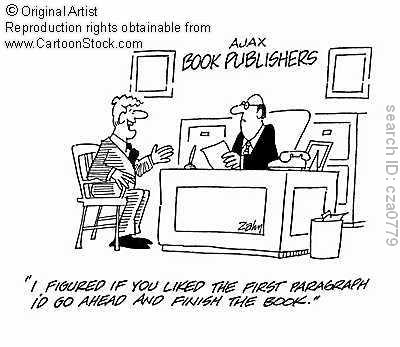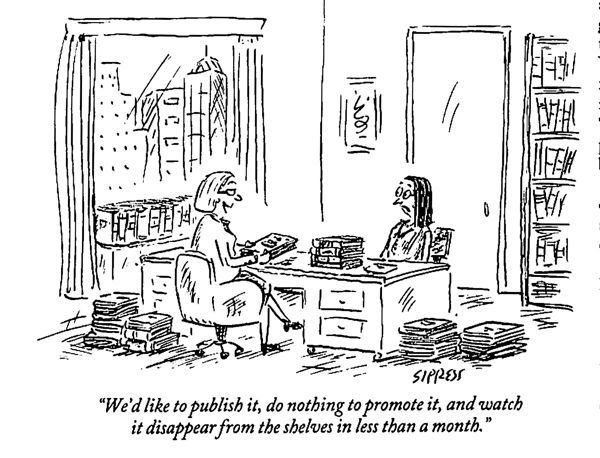
Publishing Success: A Writer’s Wresponsibility
September 12, 2013



So, you wrote a
book. It is not an easy feat by any means, but as we have said time and time again on
this blog: that in no way guarantees success. So you wrote a really good book.
Maternal critics aside, this is also no easy feat. To get more people than only your mom to
be interested in your writing is an accomplishment not to be taken for granted,
but it still does not guarantee success. So you wrote a book and got an offer
for publishing. NOW we’re getting somewhere… but getting your book published
is still not even a guarantee of success.
book. It is not an easy feat by any means, but as we have said time and time again on
this blog: that in no way guarantees success. So you wrote a really good book.
Maternal critics aside, this is also no easy feat. To get more people than only your mom to
be interested in your writing is an accomplishment not to be taken for granted,
but it still does not guarantee success. So you wrote a book and got an offer
for publishing. NOW we’re getting somewhere… but getting your book published
is still not even a guarantee of success.
Why am I being
purposely facetious while telling you things you probably already know? Well
for one thing, I just like any excuse to be and use the word facetious. More
importantly, however, it is to emphasize the hierarchical way in which we approach
success as writers. From great ideas and creativity to a final draft, our peers
(and sometimes our own mothers) edit and approve of a published product sold online and/or in
bookstores throughout the universe! Well… maybe just around the world… but
still…sold… to real people.
purposely facetious while telling you things you probably already know? Well
for one thing, I just like any excuse to be and use the word facetious. More
importantly, however, it is to emphasize the hierarchical way in which we approach
success as writers. From great ideas and creativity to a final draft, our peers
(and sometimes our own mothers) edit and approve of a published product sold online and/or in
bookstores throughout the universe! Well… maybe just around the world… but
still…sold… to real people.
All joking aside,
the important idea we are trying to convey this month is that publishing is a
huge part of your career as a writer. It can sometimes be considered more
important than the writing of the book itself. If you want to have a successful
career as a writer, people have to read your book(s).
How do they get access to them? You publish them in some form or other.
the important idea we are trying to convey this month is that publishing is a
huge part of your career as a writer. It can sometimes be considered more
important than the writing of the book itself. If you want to have a successful
career as a writer, people have to read your book(s).
How do they get access to them? You publish them in some form or other.
Because publishing
is such a critical part of your success as a writer, it is important to put as
much (if not more) thought and energy into that as you did into actually writing the
book. There are several considerations that have to be made when publishing
that we have discussed in earlier posts, but some highlights include:
is such a critical part of your success as a writer, it is important to put as
much (if not more) thought and energy into that as you did into actually writing the
book. There are several considerations that have to be made when publishing
that we have discussed in earlier posts, but some highlights include:
1.
Target Audience
Target Audience
2.
Style (fonts, cover art, photos
within the book, descriptions, bios, etc)
Style (fonts, cover art, photos
within the book, descriptions, bios, etc)
3.
Format (ebook, hardcover,
trade, etc)
Format (ebook, hardcover,
trade, etc)
4.
Distribution goals (how and
where do you want do focus your energy for distribution)
Distribution goals (how and
where do you want do focus your energy for distribution)
But most importantly:
5.
HOW (How will you publish your book?
Will you go through a publishing company, or will you self-publish?)
HOW (How will you publish your book?
Will you go through a publishing company, or will you self-publish?)
Strengths and
weaknesses of either using publishing companies or self-publishing your work have been
discussed in previous posts, however it is important to think about this as the
foundation on which your publishing success rests. Here, I think it is important
to be facetious one last time (for this post anyway): do not, I repeat, DO NOT use self-publishing
just because your book has been rejected or because you’re too afraid it might be.
weaknesses of either using publishing companies or self-publishing your work have been
discussed in previous posts, however it is important to think about this as the
foundation on which your publishing success rests. Here, I think it is important
to be facetious one last time (for this post anyway): do not, I repeat, DO NOT use self-publishing
just because your book has been rejected or because you’re too afraid it might be.
If you think your
book is going to be rejected, it warrants maybe a slight (or extensive)
revision of your book and your expectations. If your book is rejected from a
publishing company and you do still want to publish, be sure to consider the
comments and suggestions made by the publishing company.
book is going to be rejected, it warrants maybe a slight (or extensive)
revision of your book and your expectations. If your book is rejected from a
publishing company and you do still want to publish, be sure to consider the
comments and suggestions made by the publishing company.
Take an active
role in understanding where they are coming from. Remember that
publishers/editors have experience in knowing what sells and how to best relate
to their readers, however at the same time don’t forget they are also just
people. Everyone has different opinions, which is why it is so critical to look
at the WHY. Someone may have a personal dislike of your material but also may have
objective reasons why it is just unwise to publish. See how it starts to get a
bit more complicated than just “yes or no.” And why “NO” doesn’t always mean
you are a bad writer or even shouldn’t be published.
role in understanding where they are coming from. Remember that
publishers/editors have experience in knowing what sells and how to best relate
to their readers, however at the same time don’t forget they are also just
people. Everyone has different opinions, which is why it is so critical to look
at the WHY. Someone may have a personal dislike of your material but also may have
objective reasons why it is just unwise to publish. See how it starts to get a
bit more complicated than just “yes or no.” And why “NO” doesn’t always mean
you are a bad writer or even shouldn’t be published.
Challenge yourself
to start taking responsibility for your writing beyond just writing the book.
That is one of the largest keys to publishing success: Responsibility (but not
the only one so still tune in throughout the month as we look at other keys to
publishing success!)
to start taking responsibility for your writing beyond just writing the book.
That is one of the largest keys to publishing success: Responsibility (but not
the only one so still tune in throughout the month as we look at other keys to
publishing success!)
You May Also Like

The Choices You Make and The Writing You Do
June 5, 2013
Does Money Matter Most When You Write?
February 20, 2012






One Comment
Jill
How true! The responsibility of the author included so much more than just penning a story!